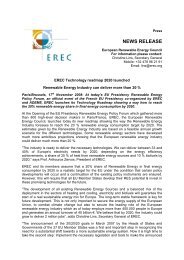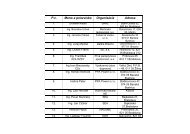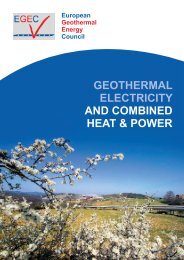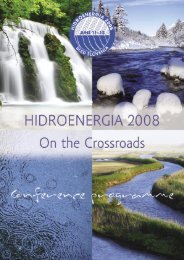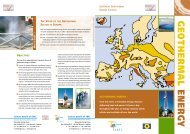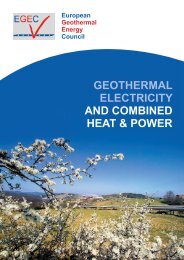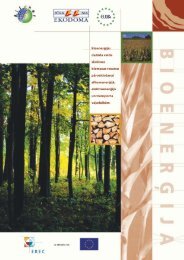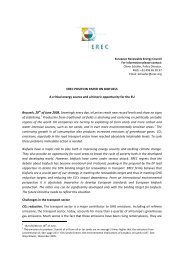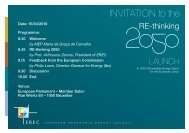CTO Assessment - European Commission
CTO Assessment - European Commission
CTO Assessment - European Commission
Create successful ePaper yourself
Turn your PDF publications into a flip-book with our unique Google optimized e-Paper software.
BULGARIA<br />
National<br />
RES Programme<br />
Contact: Mr. Tasko Ermenkov • Energy Efficiency Agency<br />
Ministry of Energy and Energy Resources • Bulgaria<br />
Tel: +359 2980 0644 • Fax: +359 2981 5802<br />
E-mail: Ermenkov@seea.government.bg<br />
Bulgaria imports 70% of the primary energy<br />
carriers it needs and the National GDP<br />
energy intensity is higher than the EU country<br />
average. The RES share is less than<br />
0.4%. Since 1999 legislative initiatives have<br />
started to be developed. The National Programme<br />
on RES is designed to support these<br />
developments by increasing the share of renewables<br />
with the aim of reaching 8% by<br />
2010.<br />
Main aims and motivations<br />
to reduce dependency on energy imports<br />
to introduce modern clean and green energy<br />
generation technologies from the EU<br />
to realise prospective investments of 1647<br />
MUS$<br />
to create 2000 more jobs by 2010, and<br />
to save 4373 thousand tons of CO 2<br />
/y<br />
The Programme<br />
920 investment projects and project proposals<br />
within the NPRES have been collected by<br />
the Energy Efficiency Agency (EEA). They<br />
include solar hot water, solar PV, wind power<br />
generators, small and medium hydro,<br />
geothermal, biomass and biogas installations.<br />
The EEA will organize seminars, workshops,<br />
mass media transmissions and be responsible<br />
for training courses and brochures.<br />
NPRES has the task of amending the legal<br />
framework by drafting new laws and harmonizing<br />
them with those at EU level. Another<br />
aspect is the establishment of regional<br />
and communal programmes for sustainable<br />
RES technology development.<br />
Overall evaluation<br />
Many projects are underway (see table) and<br />
some municipalities have developed local plans<br />
for the use of RES. Local investors and entrepreneurs<br />
have become interested. Though<br />
the campaign is taking more time than<br />
planned, it is setting good guidelines for future<br />
campaigns as this is the first ever national<br />
programme on widespread application<br />
of Renewable energies in the Republic of<br />
Bulgaria.<br />
The process would be made easier through<br />
better interaction between the institutions<br />
involved and greater networking would be<br />
advantageous. Of primary importance are<br />
the favourable changes to legislation as they<br />
enable the projects to be conceived and completed,<br />
e.g the New Energy law with a special<br />
chapter for RES.<br />
Main Innovative Aspects<br />
Public private partnership should be used in<br />
projects. A Green certificate system is<br />
planned to be put in force to regulate and<br />
facilitate the electricity produced by RES and<br />
CHP. The EEA is also promoting a performance<br />
contracting model for the Bulgarian<br />
conditions, various mixed financing schemes<br />
and special credit lines for RES projects.<br />
Enabling factors<br />
Technical assistance was provided by technical<br />
universities, the Bulgarian academy of<br />
science and private companies. Government<br />
policy also supported the campaign objectives.<br />
Financial backing came from<br />
ALTENER, PHARE and SAVE. The Ministry<br />
of Energy and Resources, The Ministry<br />
of Environment and Water, The Ministry of<br />
Regional Development are also involved in<br />
this promotional process.<br />
Challenges<br />
Still there are insufficient financial means to<br />
implement projects. There is a necessity for a<br />
real open energy market and relevant energy<br />
efficient and renewable legislation that ensures<br />
such a market will work to decrease<br />
financial difficulties.<br />
Insufficient public knowledge of RES and<br />
related issues can be combated through the<br />
establishment of more examples of different<br />
RES installations within the country.<br />
Change in perception of implementing<br />
RES projects (1999 – 2003)<br />
The issue of sustainable energy is of greater<br />
concern today than in 1999 due to better<br />
training courses and awareness and obstacles<br />
to RES development are decreasing<br />
due to the same reasons and also supportive<br />
legislation.<br />
Technology Objective To be achieved<br />
PV Systems<br />
Thermal collectors<br />
Privately owned<br />
wind farms<br />
CHP biomass<br />
Installations<br />
High temperature<br />
geothermal<br />
86 Solar PV projects with a total value replaced conventional energy 43,484 MWh/y<br />
Of 49.7 MUS$; power capacity 12.34 MW<br />
52.5 thousand tons/y reduced CO 2<br />
emissions<br />
509 Solar Thermal collector projects with total replaced conventional thermal energy 709,506<br />
Value 81.09 MUS$; heat capacity 202.72 MW MWh/y; 248.3 thou t/y reduced CO 2<br />
emissions<br />
30 wind power projects with total value of replaced conventional electric energy 373,260<br />
162.19 MUS$; total power capacity of 62.22MW MWh/y; 451.1 thou t/y reduced CO 2<br />
emissions<br />
89 Biomass, biogas, and natural gas (detander) replaced conventional heat energy 3,118,233<br />
projects. Value 393.22 MUS$; total heat capacity MWh/y; 1,372.1 thou t/y reduced CO 2<br />
emissions<br />
498.71 MW; total power cap 244.26 MW<br />
48 projects with value 393.22 mUS$; total heat replaced conventional heat energy 3,145,728<br />
capacity of 786.44 MW<br />
MWh/y; 1,100.1 thou t/y reduced CO 2<br />
emissions<br />
82 <strong>CTO</strong> - Showcase




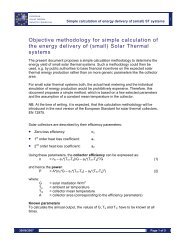
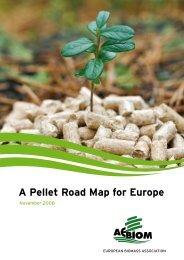
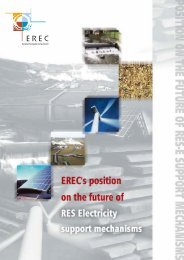
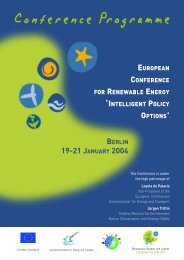
![Energy [R]evolution - Greenpeace](https://img.yumpu.com/47174859/1/184x260/energy-revolution-greenpeace.jpg?quality=85)
